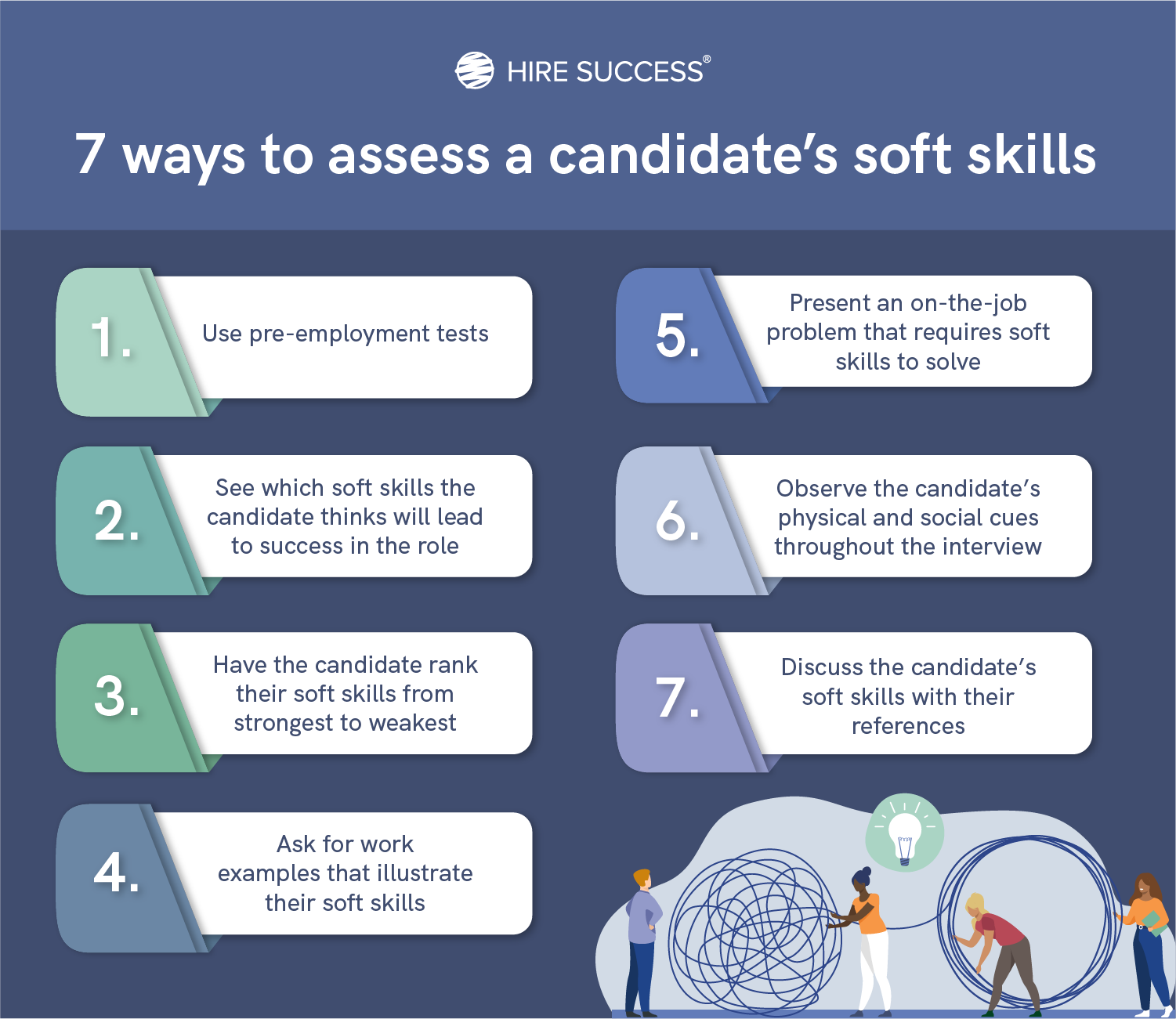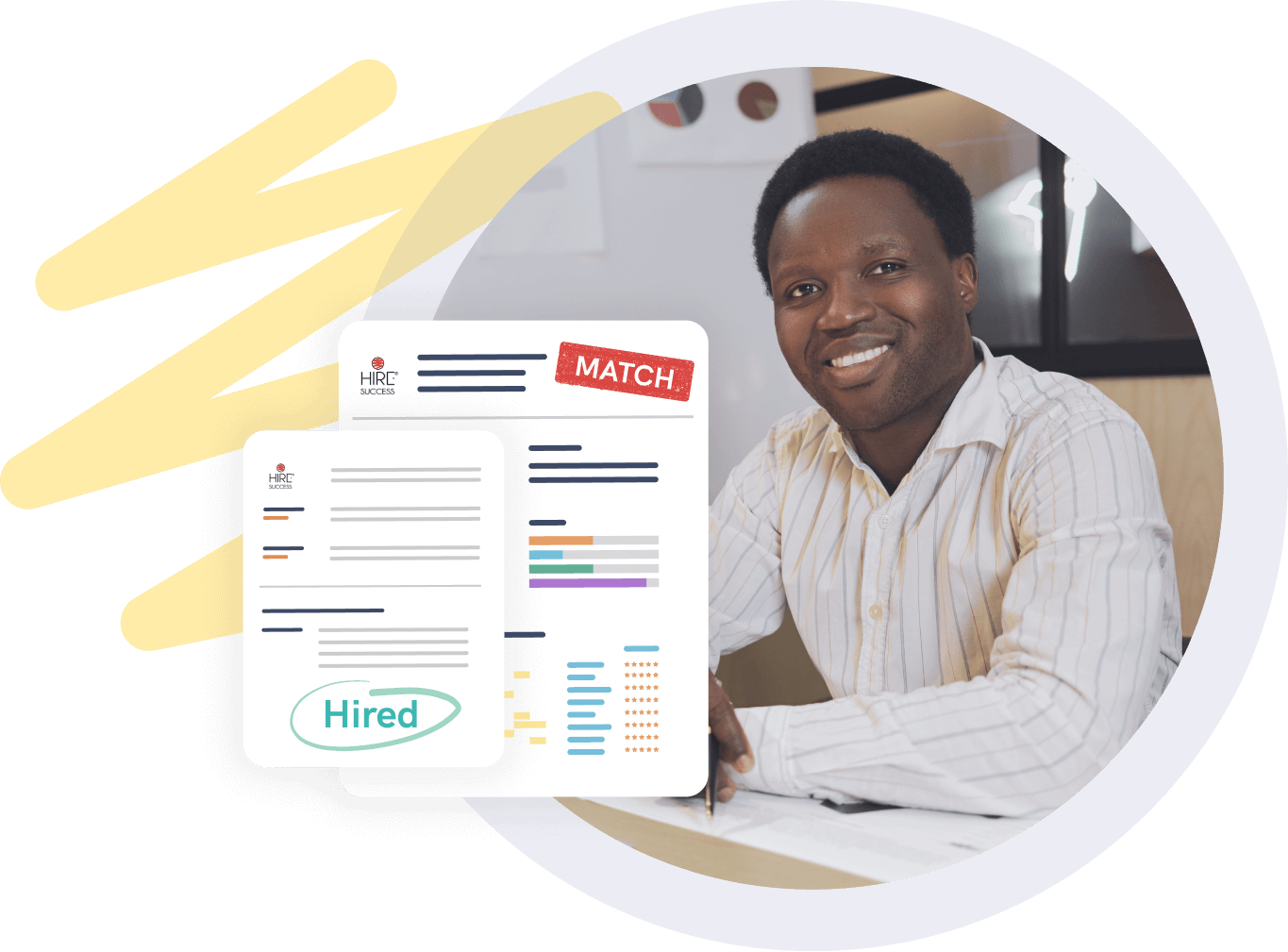Hiring the right person for the job goes beyond identifying candidates with the required technical skills. You also want to find someone who will fit your team culture, thrive under pressure, and contribute beyond what’s listed on their resume. But how do you assess soft skills like communication, teamwork, and emotional intelligence when resumes and traditional interviews can only tell you so much?
Soft skills determine how employees interact with others: coworkers, managers, customers, clients, vendors, and anyone else they might come in contact with while representing your brand. Non-technical skills are a critical part of any job yet they’re difficult to identify and screen when assessing job candidates. How can you tell whether the friendly, outgoing person you meet will be the same person showing up for work every day?
Here’s what you need to know about soft skills and how to identify them.
Key takeaways
- Soft skills, such as communication and collaboration, are critical for the long-term success of employees in your organization.
- Assessing soft skills during the hiring process helps cultivate your company’s culture and minimizes the risk of making poor hiring decisions.
- Use personality testing to objectively evaluate soft skills. Traditional methods like resumes and generic interview questions are often inadequate for measuring candidates’ soft skills.
- Align candidates' soft skills with top performers in your organization to build high-performance teams.
What are soft skills and why are they important in the workplace?
Soft skills are personal qualities and interpersonal abilities that often determine an employee's long-term success in their role. They include non-technical skills, such as personal traits and behaviors, that impact how an employee interacts with their colleagues, adapts to change, and contributes to the team. Very few jobs are isolated. Whether they work in teams, deal with clients, vendors, the public, or the board, almost every employee interacts with others as part of their job.
Why are soft skills important? Because these skills will ultimately determine how successful your new hire will be and how well they will fit in, failing to assess a candidate’s soft skills is an important hiring mistake to avoid. While technical skills are often seen as the key to career success, research reveals a different picture: soft skills and people skills hold the real power, contributing a whopping 85% to job performance. This is why soft skills are one of the top qualities employers look for in job candidates.
12 examples of the most-desired soft skills
When hiring an employee, you’ll want to look for candidates with soft skills that reflect the needs of the specific position. That said, here are some examples of the soft skills that employers usually find most desirable:
- Leadership ability
- Adaptability
- Effective communication
- Listening skills
- Empathy
- Professionalism
- Strategic thinking
- Problem solving
- Time management
- Creative thinking
- Teamwork skills
- Dependability
Can soft skills be measured and quantified?
Without the right tools, soft skills can be difficult to accurately assess during the interview process. Most traditional soft skills evaluation methods fail, sometimes disastrously.
The Hire Success® Personality Test gives you the tools to objectively measure your job candidates’ soft skills. Applicants complete the assessment using a 5-point scale and 100 adjectives. Each assessment is then automatically scored by the system, which generates an easy-to-read summary report along with suggested interview questions based on the candidate's responses.
Consider the traditional hiring process. First, choose candidates based on their resume and what they choose to tell you. This information might be embellished or carefully edited, and, if the candidate is savvy, tailored to highlight the required skills in your job posting. Even if you’re using a recruiter, they are unlikely to understand the candidate’s personality traits.
So far, you’re flying blind, but that can be fixed in the interview, right? Sorry, once again. You’re only going to see what the candidate wants to show you. Worse, you may see nervousness or desperation from the perfect candidate.
Many interviewers will try to get a sense of the candidate’s personality by asking how they got along at their last job or to identify their strongest personality trait. They’ll hear the same answer from every candidate. It’s probably unhelpful.
If this sounds familiar, it’s time to get creative and throw out old school interview processes and start hiring the right people based on solid information.
7 ways to assess a candidate’s soft skills
Fortunately, there are better ways to get to know your applicant pool. Before you launch your hiring campaign, measure and assess the soft skills of your most successful employees in the role to establish a job baseline. With in-house data, you can find the most successful person.

1. Use pre-employment tests to identify soft skills
One of the most powerful tools in today’s hiring process is pre-employment personality testing. These types of assessments can reveal important information about a candidate, such as their organizational approach, management style, personal traits, how they interact with the work environment, as well as how they interact with others.
By comparing the answers given by your star performers to the others, you can shortlist candidates with the skills and personality traits of your successful employees. Hiring the right fit is good for you, your team, and your new hire. It may even be good for your brand. The right tools can help you avoid bad hires and the damage they cause.
2. Ask which soft skills the candidate thinks will lead to success in the role
During the interview, ask the candidate to explain what soft skills they consider important for the job. If they don’t understand the job well enough to know what skills they need for the role, they are unlikely a good fit.
3. Have the candidate rank their soft skills from strongest to weakest
Ask the candidate to rank their soft skills from strongest to weakest. For a candidate trying to base answers on what they think you want, it can be a minefield. Most people will either be honest or try to guess what you want to hear. Either is revealing. If they list the primary soft skills you’re looking for among their weakest skills, they are probably not the best hiring option.
4. Ask for work examples that illustrate their soft skills
By asking for previous work examples, you give prospective employees the opportunity to show how well they understand what soft skills are necessary and how to handle difficult situations.
It’s a good way to assess how well the candidate would fit in your team and whether they would react in a way that would not be disruptive or damaging to your company culture.
Invest in future performance, predict long-term fit
Use our personality assessment to identify candidates who will thrive in their role and in your evolving organization.
Book a Demo Try It Free
5. Present an on-the-job problem that requires soft skills to solve
Another good way of assessing soft skills is to present a scenario they might encounter — perhaps something that happened within your company — and ask how they would address the problem.
Any direct or remote team environment may require conflict resolution and problem-solving skills. How the candidate answers can potentially reveal red flags or identify someone who is a great fit for your team. Soft skills evaluation methods such as these identify great hires and reduce employee turnover.
6. Observe the candidate’s physical and social cues throughout the interview process
Body language can reveal how people interact. Watch body language throughout the interview process to gain additional insight into their soft skills. You should be able to tell whether they are delivering confident personal answers, improvising, or trying to remember scripted answers.
Bear in mind that some candidates will be nervous during the interview. This may result in fidgeting, sweating, stammering, babbling, or struggling to maintain eye contact. If those behavioral issues are consistent, they may not be red flags. However, behavioral shifts might be a red flag.
You might also want to note how they treat others in your organization, including other potential hires, receptionists, and passersby. The last thing you want on a well-functioning team is a rude or distracting employee.
7. Discuss the candidate’s soft skills with their references
When you’re checking references after the interview, throw in a few questions about the former employee’s soft skills. Did they show signs of leadership? Were they given additional responsibilities? How did they get along with the rest of the staff? HR departments in big companies may not have answers, but some employers will share insights. Cross-reference their answers with information acquired for a better idea of how the candidate would perform on the team.
Can soft skills be taught to employees?
Depending on the adaptability of the employee, they can develop soft skills with training and experience much like any other essential skill. They may need to learn things like how to deal with different types of people, exercise creative thinking, or practice conflict resolution. Personality types are difficult to change, but interpersonal skills can be learned.
Tips for helping your employees develop and improve their soft skills
You know why soft skills are important, but new employees may not have the experience to understand how interactions influence and enhance the team. If you have an employee with the right skills and potential, it’s worth it to help them develop the necessary soft skills to realize their full potential. It’s not just a benefit to your company. It’s an important career building step for them.
- Create training and mentorship opportunities. Forging a relationship with a role model is one of the most powerful teaching methods you have. Senior employees can serve as good examples, offering a sounding board and providing valuable feedback based on close observation.
- Offer constructive feedback to your employees. Positive feedback and gently phrased corrections are essential. Keep in mind that people are sensitive to criticism and keep any instructions constructive. Mention what they are doing right and wrong.
- Use metrics to track soft skill development. Soft skill metrics can be difficult to track. Tools at your disposal include feedback from mentors and co-workers, observation, and disciplinary records. However, soft skills assessment tests help the most. Testing your employees and referring back to assessment results on a regular basis can help you measure and assess soft skills. Soft skills testing can also help you spot potential for advancement.
- Lead by example. Senior members of your organization, including you, set the tone for interpersonal relations. Use your authority to establish a robust, inclusive company culture of encouraging innovation, teamwork, and respect.
- Host interactive workshops. Live workshops that encourage workers to participate in realistic scenarios are an impactful way to demonstrate proper situation management. Be sure to include time for discussion after the exercise.
- Provide opportunities for practice. Developing problem solving abilities is difficult. Give your employees opportunities to test their skills with a company retreat that focuses on team-building. Start projects centered around company initiatives, like organizing a charity or sustainability program.
The employee experience is more important than ever today. To be competitive and retain top talent, your organization must build a company culture that makes employees feel included and valued, whether working in an office environment, remotely, or both.
Company culture depends entirely on the soft skills of your employees. It is imperative that you improve your hiring process and hire the right people.
The best way to ensure hiring the right fit for your team is by starting your hiring campaigns with work personality tests and comparing results to your job baselines. The effort put into hiring the right people for each position will pay for itself with a stronger team and lower turnover rate.


